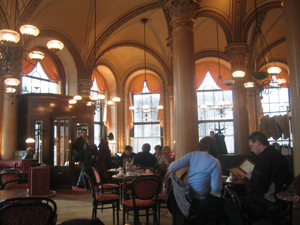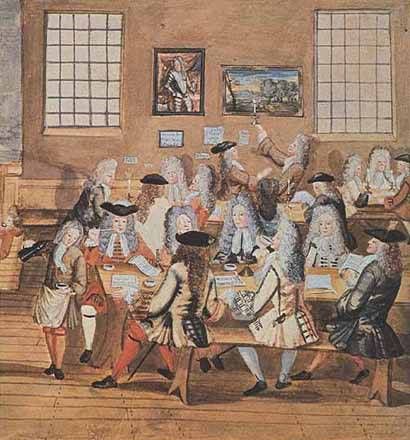Honoré de Balzac fueled his writings and shortened his life with a fanatical addiction to coffee. He cranked out la comédie humaine in all-night sessions during which he drank as many as fifty demitasses of the powerful black liquid. Doctors recorded in his autopsy the effects of this ultimately lethal poisoning. But Balzac himself was conscious of what he was doing. In a little-known forerunner to Les Paradis artificiels of Baudelaire, he described the physical impact of excessive coffee consumption on the human frame. (Quote for the Day).
Yet for this tragic encounter, the European obsession with coffee which began in proper form in the eighteenth century and can be called a hallmark of the Enlightenment and seems a happy and positive meeting. European culture of the eighteenth, nineteenth and twentieth centuries could hardly be imagined without coffee and the culture that was crafted around it. Coffee was the continental European equivalent to the British obsession with tea. And in the end the story of the rise of coffee is about the restructuring of a civilization—the rise of a middle class consumer culture in which coffee was one of the first bourgeois luxuries, the rise of a cafe culture that promoted journalism, literature and the high arts, once the reserve of the aristocracy, as the territory of the rising middle class.
In the current Eurozine, Jakob Norberg gives us a good scan of the intellectual horizon of coffee and civilization. There are many pillars that could be noted along the way: Ludwig Börne, who saw in the culture and paraphernalia of coffee the manacles of a rising age of materialism; Immanuel Kant, who, in terms almost identical to Dr. Johnson, viewed the beverage as an essential intellectual stimulus, and the antidote to the ravages of commercialized mass alcohol production; the Viennese of the fin-de-siècle who built a glittering culture that revolved around coffee houses where the mélange and the Fiaker were the drinks of choice.

But Norberg looks to that Teutonic duo who most recently have come to dominate debates about culture, morality and the national security state: Jürgen Haberman and Carl Schmitt.
For Jürgen Habermas, the coffeehouse is a place where bourgeois individuals can enter into relationships with one another without the restrictions of family, civil society, or the state. It is the site of a sort of universal community, integrated neither by power nor economic interests, but by common sense. For Carl Schmitt, coffee is a symbol of Gemütlichkeit, or the bourgeois desire to enjoy undisturbed security….
In his survey of how the bourgeoisie gradually constitutes itself as a public interlocutor in matters of governance, Habermas relates how this class emerges as a collectivity claiming the right to subject political decisions to a standard of argumentative reason. The exemplary case of a successful transition from autocracy to public discussion is, for Habermas, modern England. And the primary locus of English bourgeois discourse is a new social venue, the coffeehouse. The coffeehouse provides Habermas with the most satisfying historical instantiation of the speech conditions that he deems foundational for rational political self-determination: non-hierarchical deliberation rooted in shared capacities for reasoning, detached from the economic field of transactions and freed from the constraints of religious dogma.
But why does the coffeehouse play such an important role in the formation of the public sphere? And why coffee and not the equally exotic tea or chocolate, two other consumer goods introduced by the middle of the seventeenth century, whose careers are intertwined with England’s rise as a global trading power? What specifically about coffee gives it the power to make the bourgeoisie a more politically vocal class? Caffeine is, after all, a “psychoactive addictive substance” with “antihypnotic and antifatigue properties.” Does the ingestion of this drug wake a dormant class, long unaware of its political potential, from drowsiness? Is the conspicuous consumption of an oriental drink indicative of a systematic legitimation of the previously scorned pursuit of luxury, all according to new principles of political economy? Is the sudden restlessness of the bourgeoisie, its increasingly explicit ambition to influence legislation, fuelled by a caffeine kick?
Historians of stimulants have tried to invest coffee with characteristics that would explain its agreeability to the bourgeoisie. Coffee does not contain alcohol and can easily be promoted as its antidote, as a means to maintain energetic sobriety and keep working, a disposition in line with the ascetic ethos of the agents of early capitalism. There is no shortage of advertising material from the period to support such a view. Drawing on puritan coffee propaganda, the historian Wolfgang Schivelbusch asserts that, with coffee, rationalism entered the physiology of man. Its somatic effects associate it with the exhortation to constant alertness and activity.

Carl Schmitt has enjoyed an unprecedented revival in recent years as his works have been championed by both Marxists and Neoconservatives for his devastatingly effective criticism of traditional liberalism. And since 9/11, Schmitt has emerged as a favorite of advocates of a new prioritization of national security concerns who seek to dismantle traditional civil liberties. Not surprisingly, for Schmitt, coffee links to the code word Gemütlichkeit and that in turn is transcribed as “security.”
In Schmitt’s view, the typical bourgeois philistine, unmistakably portrayed in his entry, is not so much ascetically opposed to pleasure as he is wary of pleasure that cannot be enjoyed securely – that is – without worry. Coffee, in combination with tobacco, stands for intoxication without risk; it is a stimulant that does not dangerously loosen the subject’s self-possession. It signifies a furtive bliss distinguished from the ecstatic, which implies a movement transcending the bounded ego lodged in the safety of plush comfort.
Yet the note contains a more far-reaching critique. Schmitt contends that the comfortable life in the bourgeois interior, despite its mundane and modest quality, seduces men into a sinful attachment to worldly enjoyment. The sinfulness resides in the pursuit of security: the will to achieve a state of complete safety in the shielded salon betrays a blasphemous belief in the possibility of a man-made utopia.
Schmitt’s diary entry might come across as a peculiar expression of a severe Christian ethos, but he joins a long line of critics of the bourgeoisie, who fault it for its incapacity to appreciate a community that extends beyond the realm of the family. The bourgeois individual typically believes that his real life plays out in the private sphere, and perceives the outside world as a foreign and dangerous territory. To the extent that the bourgeoisie does act politically, however, it continues to be guided by the desire for security nurtured in the home, and its ambition is to turn the world into a calm interior. To the bourgeoisie, conflict rudely disturbs the continual traffic of discourse – it should simply not take place. At this point, the bourgeois host’s call for the re-establishment of placid conversation – Nur immer gemütlich! or “Temper! Temper!” – sounds increasingly sinister.
So there you have it: concentration camps or a liberal democracy? It’s all in how you take your coffee.



